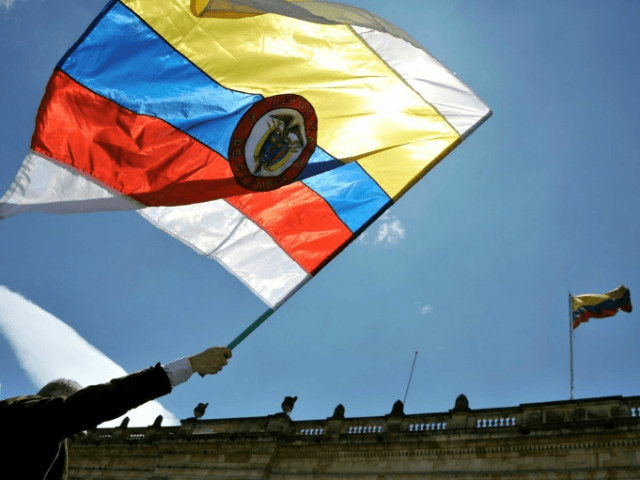Colombia’s Marxist FARC terrorists have announced that they will launch a political party in the nation’s capital in September, the product of years of peace negotiations with the government of Juan Manuel Santos that will also allow most in the terrorist group to escape prison sentences.
Santos passed a peace deal through Congress allowing the FARC to create a political party after a constitutionally-mandated national referendum saw a plurality of Colombians reject impunity for one of the world’s wealthiest narco-terrorist organizations.
As a result of that peace deal, FARC commander Carlos Antonio Lozada told the Agence France-Presse on Monday that the FARC is planning a celebration to launch its political party on September 1. The FARC have not yet agreed on the name of the party or a consistent policy platform, but have scheduled a “congress” of its terrorist leaders for late August.
“We will publicly launch the party on September 1 in the Plaza de Bolivar,” Bogotá, Lozada said, which the AFP notes will be close to the date of the arrival of Pope Francis to Colombia. The pope has supported the so-called peace process between the Santos government and the terrorist group, which has killed at least 260,000 in its half-century of existence and caused the disappearance of another 60,000 Colombians.
The FARC is also responsible for innumerable abductions for ransom, use of child soldiers, incidents of child rape and, as a consequence, forced abortions on rape victims.
The terrorist group is required to set up a political party as part of the deal, which also allowed its members to hand over their weapons and face a special tribunal that would allow many to return to civilian life without serving jail time. As per the deal, the government has reserved ten seats in the Colombian Congress—five in the Senate and five in the House of Representatives—through 2026, in which no candidate can win an election to replace and diminish the presence of this Marxist organization in the legislature.
AFP notes that in addition to losing the peace deal referendum—with particularly strong “no” votes in the rural areas most affected by FARC violence—82 percent of Colombians hold a negative opinion of the FARC, which suggests their political party would not fare well in a free election. They are so unpopular that a group within Colombia is offering up to $1 million as a bounty for killing the leaders of the FARC, who reside in exile in collaborator country Cuba. Rather than invest in keeping the FARC from influencing the lives of civilians they have terrorized since the 1960s, the government is instead paying for security for the FARC representatives being allowed in Congress.
Among the many variables that remain in establishing the FARC as a political party in the country, and presumably not also a narco-terrorist group, is the fate of the groups exorbitant, largely cocaine-driven profits. In June, a Colombian prosecutor announced that his research had found that the FARC possessed hundreds of millions of dollars in assets gained from drug trafficking, abductions, illegal mining, and extorting peasants, among other illegal activities. Previous studies had suggested the FARC may possess over ten billion dollars worth of assets they could pour into political campaigns across the country, which would make them essentially the wealthiest political party in the country.
Colombian government officials have insisted that they are fully aware of the FARC’s assets and that they will be used to provide damages for FARC victims. “We have a lot of information on the issue, in fact since the first moment that we began negotiations with the FARC we had an investigative line regarding precisely the FARC’s finances,” Jorge Perdomo, the attorney in charge of the FARC reintegration process, told reporters. Justice Minister Enrique Gil Botero said in June that the FARC’s money “is primarily for the victims. All the income that the FARC hands over will go to reparations for the victims and then to economic projects as per the Havana agreement.”
The FARC peace deal is the product of intense negotiation mediated by Cuban dictator Raúl Castro, who squeezed his way into photos with Santos and FARC terror chief “Timochenko” following the signing of the agreement in Havana in 2015.

COMMENTS
Please let us know if you're having issues with commenting.